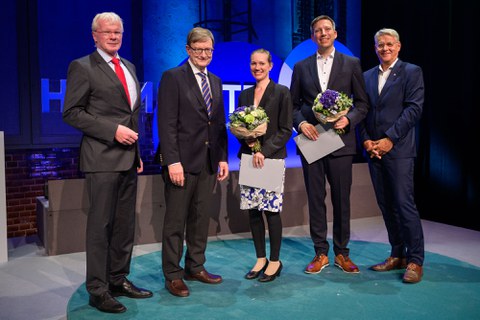18.09.2024
Neue Bildgebungsverfahren in der Krebschirurgie: Helmholtz High Impact Award für Oliver Bruns und Ellen Sletten

Ferdi Schüth, Juryvorsitzender, Direktor am Max-Planck-Institut für Kohlenforschung, Otmar D. Wiestler, Präsident der Helmholtz Gemeinschaft, Ellen Sletten (UCLA), Oliver Bruns (NCT/UCC Dresden) sowie Volker Meyer-Guckel, Generalsekretär des Stifterverbandes für die Deutsche Wissenschaft (v.l.n.r.).
Der Biochemiker Oliver Bruns (NCT/UCC Dresden) und die Chemikerin Ellen Sletten (UCLA) werden für ihre Forschung an einer neuen medizinischen Bildgebungstechnologie im kurzwelligen Infrarotbereich von der Helmholtz-Gemeinschaft und dem Stifterverband für die Deutsche Wissenschaft mit dem Helmholtz High Impact Award 2024 ausgezeichnet. Das von ihnen entwickelte Verfahren hat das Potenzial, das operative Entfernen von Tumoren deutlich zu verbessern. Bei der gestrigen Preisverleihung in Berlin wurde den beiden Wissenschaftler:innen der mit 50.000 Euro dotierte Preis für ihre interdisziplinären Forschungsarbeiten übergeben.
Die größte Herausforderung bei der optischen Bildgebung beim Menschen ist das Durchdringen von Gewebe. Bisherige in der Medizin genutzte Bildgebungstechniken stoßen in tieferen Gewebeschichten an ihre Grenzen. Dies bedeutet, dass beispielsweise in der Krebsbehandlung Tumorreste bzw. einzelne Krebszellen an Tumorrändern und in Lymphknoten nicht erkennbar sind. Für ihre neu entwickelte Methode, kurzwelliges Infrarotlicht mit speziellen fluoreszierenden Farbstoffen und modernster Kameratechnologie zu kombinieren, um genau diese Tumorzellen sichtbar zu machen, erhalten Prof. Ellen Sletten und Prof. Oliver Bruns jetzt den Helmholtz High Impact Award 2024.
„Mit der Nutzung von Infrarot in der Bildgebung können wir anhand des Wassergehalts verschiedene Gewebetypen bestimmen“, erläutert Oliver Bruns das Verfahren, bekannt als SWIR-Bildgebung. In Kombination mit speziellen Fluoreszenzfarbstoffen wird es möglich bestimmte Gewebe und Strukturen, wie Tumore oder Blutgefäße, gezielt sichtbar zu machen. Daran forschen die Wissenschaftler:innen derzeit. „Die Entwicklung neuer Kontrastmittel ermöglicht es den Chirurgen, Tumore während der Operation gezielter zu erkennen. Unsere Kontrastmittel leuchten den Rand des Tumors aus und erleichtern die Entfernung von ausschließlich krebsartigem Gewebe, wobei so viel gesundes Gewebe wie möglich erhalten bleiben soll“, ergänzt Ellen Sletten.
Ziel ist es, die Technologie so schnell wie möglich in die Anwendung zu bringen. Die Anbindung der Forschung von Ellen Sletten und Oliver Bruns am Nationalen Centrum für Tumorerkrankungen Dresden (NCT/UCC) bietet dafür ideale Voraussetzungen. Die gemeinsame Einrichtung des Deutschen Krebsforschungszentrums (DKFZ), der Medizinischen Fakultät der TU Dresden, des Universitätsklinikums Carl Gustav Carus Dresden und des Helmholtz-Zentrums Dresden-Rossendorf (HZDR) hat es sich zum Ziel gesetzt, mit neuesten Technologien die Krebstherapie für Patient:innen zu verbessern. „Für die Bildgebungssysteme sind wir aktuell dabei, in Dresden und in Stanford gemeinsam mit Medizinern klinische Studien durchzuführen, um den Nutzen am Patienten zu zeigen“, sagt Bruns.
Oliver Bruns leitet seit 2022 die Abteilung für Funktionelle Bildgebung in der Operativen Onkologie am NCT/UCC Dresden. Er hat eine über das DKFZ finanzierte Professur an der Medizinischen Fakultät der TU Dresden. Zuvor war er am Helmholtz Pioneer Campus München angestellt, wo ein großer Teil der jetzt prämierten Arbeiten entstanden ist. Ellen Sletten ist Professorin an der University of California, Los Angeles, (UCLA) und zählt zu den renommiertesten Chemiker:innen ihrer Universität. Sie ist besonders bekannt für ihre Forschung an kurzwellig infraroten Farbstoffen.
Über die Anerkennung ihrer jahrelangen Forschungsarbeit sind Ellen Sletten und Oliver Bruns hocherfreut: „Wir arbeiten seit einem Jahrzehnt in diesem Projekt zusammen. Es ist großartig zu sehen, wie viel wir bereits erreichen konnten“, sagt Ellen Sletten.
„Die Forschung von Prof. Bruns und Prof. Sletten wird die Bildgebung in der Chirurgie in den kommenden Jahren revolutionieren“, ist Esther Troost, Dekanin der Medizinischen Fakultät, überzeugt. „Es ist fantastisch, dass das Team um Prof. Bruns, welches seit Jahren an dieser Technologie arbeitet, damit einen großen Nutzen in der Forschung und der Klinik bringen wird“, ergänzt Prof. Michael Albrecht, Medizinischer Vorstand des Universitätsklinikums Dresden.
Erst kürzlich erhielten Oliver Bruns und Ellen Sletten aufgrund ihrer herausragenden Forschung an der Schnittstelle von Biologie, Chemie, Ingenieurwissenschaften und Medizin eine Förderung der Chan Zuckerberg Initiative in Höhe von 2,2 Millionen US-Dollar, um diese hoch innovative Technologie weiter voran zu bringen.
Mehr zur Arbeit von Prof. Oliver Bruns: Kleinste Krebszellen im OP erkennen
Kontakt:
Nationales Centrum für Tumorerkrankungen Dresden (NCT/UCC)
Fetscherstraße 74/PF 64
01307 Dresden
+49 (0)351 458 3371
www.nct-dresden.de
Anne-Stephanie Vetter
Stabsstelle Öffentlichkeitsarbeit Medizinische Fakultät Carl Gustav Carus
der Technischen Universität Dresden
Nationales Centrum für Tumorerkrankungen (NCT/UCC) Dresden
+49 (0) 351 458 17903
www.tu-dresden.de/med
Nationales Centrum für Tumorerkrankungen Dresden (NCT/UCC)
Das Nationale Centrum für Tumorerkrankungen Dresden (NCT/UCC) ist eine gemeinsame Einrichtung des Deutschen Krebsforschungszentrums (DKFZ), des Universitätsklinikums Carl Gustav Carus Dresden, der Medizinischen Fakultät der Technischen Universität Dresden und des Helmholtz-Zentrums Dresden-Rossendorf (HZDR). Das NCT Dresden ist Teil des NCT mit weiteren Standorten in Berlin, Heidelberg, SüdWest (Tübingen-Stuttgart/Ulm), WERA (Würzburg, Erlangen, Regensburg, Augsburg) und West (Essen/Köln).
Das NCT hat es sich zur Aufgabe gemacht, Forschung und Krankenversorgung so eng wie möglich zu verknüpfen. Es ist eine langfristig angelegte Kooperation zwischen dem Deutschen Krebsforschungszentrum (DKFZ), exzellenten Partnern in der Universitätsmedizin und weiteren herausragenden Forschungspartnern an verschiedenen Standorten in Deutschland. Ziel des NCT ist es, Innovationen in der Krebsforschung in Deutschland zielgerichtet und schnell in Studien zu überführen, um Krebs bei hoher Lebensqualität erfolgreich zu diagnostizieren und zu behandeln. Patientinnen und Patienten sind dabei Forschungspartner auf Augenhöhe.
Das Dresdner Zentrum baut auf den Strukturen des Universitäts KrebsCentrums Dresden (UCC) auf, das 2003 als eines der ersten Comprehensive Cancer Center (CCC) in Deutschland gegründet wurde. Seit 2007 wurde das Dresdner Zentrum von der Deutschen Krebshilfe e.V. (DKH) kontinuierlich als „Onkologisches Spitzenzentrum“ ausgezeichnet.
